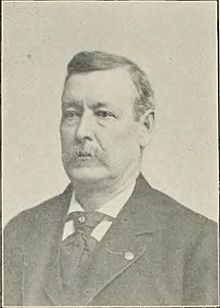William Peters Hepburn
William Peters Hepburn (born November 4, 1833 in Wellsville , Columbiana County , Ohio , † February 7, 1916 in Clarinda , Iowa ) was an American politician . Between 1881 and 1887 and again from 1893 to 1909 he represented the state of Iowa in the US House of Representatives .
Career
William Hepburn was a great-grandson of Matthew Lyon (1749-1822), who had served in the US House of Representatives for Vermont and Kentucky . In 1841 he came to Iowa with his parents, where the family settled near Iowa City . There he attended public schools. Then he did an apprenticeship as a printer. After a subsequent law degree in Iowa City and Chicago and his admission to the bar in 1854, he began to work in his new profession in Iowa City.
In February 1856, Hepburn moved to Marshalltown , Marshall County . There he became a public prosecutor in the same year. From 1856 to 1861 he was a district attorney in the Eleventh Judicial District of Iowa. In 1858 he was also an administrator for the Iowa House of Representatives . Politically, he became a member of the Republican Party , whose Republican National Conventions he attended as a delegate in 1860, 1888 and 1896. On these Abraham Lincoln , Benjamin Harrison and William McKinley were nominated as the party's presidential candidates. All three were also elected in the subsequent elections.
During the Civil War , Hepburn was an officer in an Iowa cavalry unit . By the end of the war he had attained the rank of lieutenant colonel. Between 1865 and 1867 he lived in Memphis ( Tennessee ). He then returned to Iowa, where he settled permanently in Clarinda and worked as a lawyer. In 1880, Hepburn was elected to the US House of Representatives in Washington, DC , in the eighth constituency of Iowa . There he took over from William Fletcher Sapp on March 4, 1881 . After two re-elections, he was able to complete three consecutive terms in Congress by March 3, 1887 . In the elections of 1886 he was defeated by the independent candidate Albert R. Anderson .
Between 1889 and 1893, during President Harrison's tenure, Hepburn served as an attorney for the Treasury Department. In 1892 he was re-elected to Congress for the eighth district of Iowa. There he replaced James Patton Flick on March 4, 1893 . After seven re-elections, he could remain in the House of Representatives until March 3, 1909. The Spanish-American War took place during this period . At that time, the Philippines and the former Kingdom of Hawaii fell to the United States , along with other areas . From 1895 to 1909, Hepburn was chairman of the committee on domestic and foreign trade. His name is linked to the Hepburn Act of 1906. This law was intended to force the railways to operate at fair and reasonable prices.
In the elections of 1908, Hepburn was surprisingly defeated by the Democrat William Darius Jamieson . Hepburn contested the outcome of the election without success. In the following years he practiced as a lawyer in the federal capital Washington and in his place of residence Clarinda. He died there on February 7, 1916.
Web links
- William Peters Hepburn in the Biographical Directory of the United States Congress (English)
- William Peters Hepburn in the database of Find a Grave (English)
| personal data | |
|---|---|
| SURNAME | Hepburn, William Peters |
| BRIEF DESCRIPTION | American politician |
| DATE OF BIRTH | November 4, 1833 |
| PLACE OF BIRTH | Wellsville , Ohio |
| DATE OF DEATH | February 7, 1916 |
| Place of death | Clarinda , Iowa |

